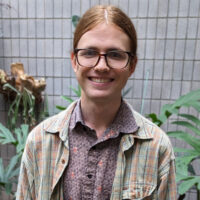
Modeling Alfalfa Growth using Remote Sensing Data
Remote Sensing provides a high throughput and nondestructive means to phenotype plant growth and development. In this study we evaluated the utility of using remote sensing data to model biomass accumulation in Alfalfa by comparing the Normalized Difference Vegetative Index (NDVI) and “ground truth” biomass measurements of Alfalfa. We used mixed models to estimate genetic correlations between images and ground truth data. We then created a Bayesian hierarchical model (BHM) to estimate growth parameters and assumed logistic growth and normally distributed priors. Results showed good correspondence between the estimated growth curves derived from yield data and NDVI. The study demonstrate a the potential of BHM for modeling plant growth and dynamic plant-environment interactions.
I am grateful to have been able to do research in the Robbins lab over this summer. With my first year college background in biology and statistics, I found myself able to meaningfully interact with and shape my project with help from my mentor and PI—Dinesh Ghimire and Dr. Kelly Robbins. Throughout this experience I employed methods of analyses for plant breeding and quantitative genetics. I have also learned how to apply these analyses more generally to answer different types of questions in different fields of study. Furthermore, the weekly seminars and meetings with my mentor and PI have modeled how to ask relevant scientific questions, and more importantly, how to answer them. Entering my second year of college with this experience of asking scientific questions has opened my eyes to research opportunities with my research at my home institution—Reed College. Doing this so early in my college career will surely be invaluable and inform my future research. Further, by gaining experience doing research at a large university like Cornell, I have seen how broad academic collaboration can enrich the quality of research. Finally, in addition to hosting us for the REU, BTI organized many events with other students. These events brought me closer to the other REU students, helped me appreciate Ithaca more, and helped me fill in the time when I wasn’t doing research. In particular, doing the farmer’s market science outreach event was so much fun; I was unsure how to represent my work to a broader audience at first but the interactions with community members and with other students in the program made the experience very enjoyable and made me a more confident presenter and researcher.
